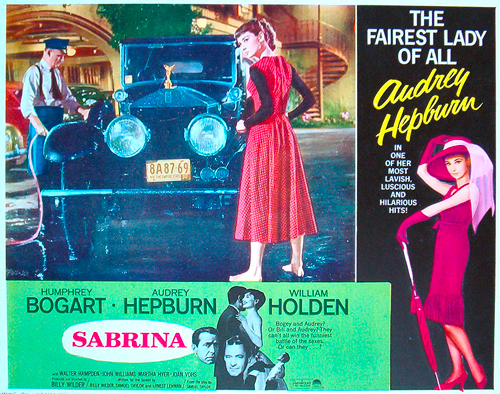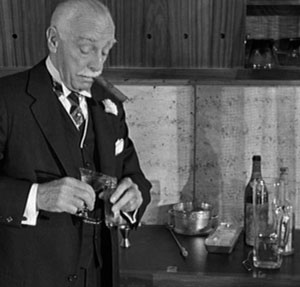 By David Ross. My wife and I rewatched Billy Wilder’s Sabrina (1954) with our five-year-old daughter. I must be growing old and stodgy, because Audrey Hepburn’s pixie beauty excited me less than the film’s burble of conservative – or at least capitalist – sentiment.
By David Ross. My wife and I rewatched Billy Wilder’s Sabrina (1954) with our five-year-old daughter. I must be growing old and stodgy, because Audrey Hepburn’s pixie beauty excited me less than the film’s burble of conservative – or at least capitalist – sentiment.
Humphrey Bogart plays Linus Larrabee, an industrialist whose various empire-building activities the film seems more or less to endorse. His latest brainchild is an indestructible sugar-based plastic. In the interest of vertical integration, he’s arranged for his playboy brother David (William Holden) to marry a sugar heiress, setting the stage for the following exchange:
David: You’ve got all the money in the world.
Linus: What’s money got to do with it? If money were all there was to it, it’d hardly be worthwhile going to the office. Money is a by-product.
David: What’s the main objective, power?
Linus: Ah, that’s become a dirty word.
David: Well, then, what’s the urge? You’re going into plastics now. What will that prove?
Linus: Prove? Nothing much. A new product has been found, something of use to the world, and so a new industry moves into an undeveloped area. Factories go up, machines are brought in, a harbor is dug, and you’re in business. It’s purely coincidental of course that people who never saw a dime before suddenly have a dollar and barefooted kids wear shoes and have their teeth fixed and their faces washed. What’s wrong with a kind of an urge that gives people libraries, hospitals, baseball diamonds, and movies on a Saturday night?

It’s true enough that Linus bolts from the boardroom to catch the steamer that’s conveying Sabrina (i.e. Audrey) to Paris, but there’s no suggestion that he repudiates his former life. He loves Sabrina; Paris is incidental. He will presumably return and resume his role as an Atlas – or at least chess master – of industrialism, without apologies.
The great figure of the film, however, is Linus’ father Oliver Larrabee (Walter Hampden). He’s a reactionary of the nineteenth century, an unrepentant, cigar-sneaking, Martini-swilling robber baron, in comparison to whom the sniveling, canoodling modern (David) and the Ivy League bean-counter (Linus) are wan indeed; in the end, the film’s particular affection is for the salty throwback.
When David announces that he’s in love with Sabrina, the chauffeur’s daughter, Linus temporizes, “This is the 20th century.” Mr. Larrabee responds with one of the great reactionary bons mots:
“The 20th century? Why, I could pick a century out of hat blindfolded and come up with a better one.”
Who knows whether this line conveys genuine ire, or whether it’s meant merely in fun. What impresses me is its mere awareness that history is a dodgy business, with the implication that those who believe ‘we’re the ones we’ve been waiting for’ must at least argue their point.
Posted on August 6th, 2010 at 7:23am.
David – you make a fine point here. It’s astonishing that we’ve gone in a few short decades from celebrating what capitalism and technological development can do to improve people’s lives around the world (such as increasing life expectancy), to now denouncing those very same developments. Blame must be placed on the left and their hatred of all things Western and capitalistic.
Aside from that however, “Sabrina” is one of my favorite films, and my only disagreement with you is on your point about Audrey Hepburn. She is infinitely more delightful than any depiction of capitalism in the film.
I absolutely love Audrey Hepburn. She is my favorite movie star of all time.
David – what do you think of “Funny Face” and its satire of left-wing philosophers/Parisian beatnik culture? The whole sequence in Paris where Fred Astaire and Kay Thompson try to save Audrey Hepburn from the clutches of the phony Professor Floster by dressing up as beatniks and infiltrating one of his meetings is absolutely hilarious.